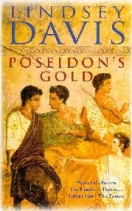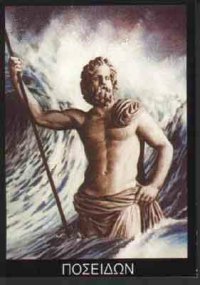
March-April, AD72, our man Falco is back in Rome, complete from his mission for the Emperor Vespasian in Germania. It is evening in Rome, cold and wet, and the sixth-floor flat on the Aventine has been broken into and occupied by squatters. Pigeons have taken advantage of the hole in the roofing, and of course, the rain is dripping through … Falco, Helena Justina and the six year old ward, Augustinilla, cannot bed down for the night. Off to Ma’s where Falco finds the centurion Censorinus (of his late brother’s Legion) in residence, awaiting his arrival. Censorinus is given the order of the boot into the pouring rain; Falco suggests he may obtain lodging at Flora’s, the local caupona, an inn where wine and ready dressed provisions are sold. There might be rooms available upstairs, suggests Falco.
No one has ever met Flora. Falco calls it a seedy snack shop. It is run by a runaway slave by name of Epimandos; a vaguely familiar beggar sits outside. Next day, Falco and Censorinus have a discussion at Flora’s, which ends in fisticuffs. The next day, Censorinus is dead, and the local watch captain, (Falco’s comrade-in-arms in Britain) Petro, is looking for him.
Everybody loves to hate Falco, for he is a private informer, in Latin a delator; aka a denouncer, that is, one who indicates to a court another as having committed a punishable deed. Moreover, as an informer, Falco had
operated for perjurers, petty bankrupts, and frauds. I swore court affidavits to denounce high-born senators for debauchery so gross that even under Nero it could not be covered up. I found missing children for rich parents who would better abandon them, and pleaded lost causes for widows without legacies who married their spineless lovers the very next week—just when I had got them some money of their own. Most of the men tried to dodge off without paying, while most of the women wanted to pay me in kind; you can guess which kind; never a sweet capon or a fine fish.
After the army I did five years of that, freelancing. Then the Emperor made an offer that if I worked for him he might raise my social rank. Earning the cash to qualify would be next to impossible, but promotion would make my family proud, and my fiends envious, while seriously annoying a the rest of the middle class, so everybody told me this mad gamble was worth a minor insult to my republican ideals. I was an Imperial agent …
Falco was the executor for the estate of his late-national-hero-brother, Festus, (who was always making some profit on the side with his father Geminus)… who had dreamt up some wild scheme importing Grecian statuary to Rome, wherein the vessel sank on the high seas. All investors lost their monies, a very sore point the recently deceased centurion Censorinus was vociferously making with Falco, and demanding restitution thereof.
So the scene is set; Falco has to clear his name of the murder of Censorinus (who was last seen in fisticuffs with Falco) and investigate Festus’ (dec.) mad scheme to profit in the trade of Greek statues.
Among the cargo of the sunken vessel, was a statue carved by the great Phidius, of Poseidon. Where is the statue, on the ocean floor? Is it an original or a fake? What is its worth? Can Falco and Geminus recoup their losses?
In this narrative, Helena Justina hears more about the relationship between Falco and his family, particularly with his absentee father, Marcus Didius Favonius (Geminus) who left home when Falco was seven, off with a red-headed scarf maker. For many years, Falco did not know his father.
As this narrative exposes much of the relationships in the Family Didius, we will be examining the role and function of family, and human values in the family, using this well-written narrative for source and examples.
Available on Amazon
Imago Roma

Poseidon, the ancient god of the seas
![]()

